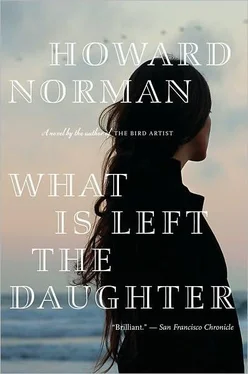"I'm sure Reverend Witt had a different result in mind," I said.
"I'm sure he did," she said. "But aren't you happy for me?"
"Productive visit to the city, sounds like," I said.
I drove the three of us to the bakery. Cornelia was all too pleased to have a tenant. She and Hans quickly settled on a price. I was irritated to see Hans Mohring pay for a whole week in advance. "You're my first German to rent," Cornelia said. "I've let my rooms be occupied by — let's see. There's been a Dutch family of four. Then there was that Swedish man and wife who admired Donald's sleds. I recall the Swedish husband said he couldn't fall asleep without a strong cup of coffee. It took me a while to realize it was a joke — I'm pretty sure. And there's been a number of French speakers from Quebec. The rooms above my bakery are a regular tourist trap, eh? Anyway, Hans, as for any European cuisine you may be used to, you're out of luck. My pastries have a reputation, however. I don't serve dinner, but I'll fix you a sandwich, meat and cheese, if you like. Tomato slices included."
"I'd be honored," Hans said.
"Honored, well! My sandwiches aren't war medals, Hans," Cornelia said. "They're just sandwiches."
"Hans is a student of philology," Tilda said. "He's careful with words. If he said honored, he meant honored, is my guess."
"I must've had the war on my mind," Cornelia said. "What with those German wolf packs turned our coast into a shooting gallery. Right, Hans?"
"I can understand your not wishing me to stay above your bakery," Hans said.
"Oh, I know you're just a student, Hans," Cornelia said. "Probably you aren't communicating shore-to-ship with U-boats."
"Please understand," Hans said. "Your government willing, I'll become a citizen of Canada. My parents, too, wish this for themselves. And my sister. They live in Denmark."
"Somehow you're not a German sailor or soldier, are you, Hans? And I wonder, how'd that happen? How did you finagle out of conscription as such? Do you come from an influential family, Hans?"
"Influential, no," Hans said. "Modest of income."
"There's Canadian citizens at the bottom of the sea off our province, yet you're welcome to stay long as you want, Hans Mohring. But you should know that every time I look at you, I might think of the bottom of the sea. That's not because of anything you yourself did, mind you."
"I'm not in the military because we left Germany," Hans said.
"Enough of this tug of war," Cornelia said. "Your rooms are nice and clean, Hans. I did the sheets yesterday, in fact. My private room is directly below your rooms, Hans, so if you have any questions, knock, and if I'm not in my nightgown, I'll meet you in the hallway and tell you what's what."
"What are the house rules?" Hans asked.
"The only house rules I've got," Cornelia said, "is that you just now paid the rent. Look, I'm sorry. It's just this war's got me so off kilter. For instance, if I'm listening to war bulletins on the radio, I can scarcely bake at all."
"I'm coming back later to have éclairs with Hans," Tilda said.
"Want me to chaperone?" Cornelia said.
"Wyatt said he would," Tilda said.
"You don't see me behind the counter, come right in anyway," Cornelia said.
"All right, then," Tilda said. "See you in a couple of hours, Hans."
Hans shook hands with me, Tilda and Cornelia Tell, in that order. "How do I get to my rooms?" he asked.
"Step out the door, turn right, you'll see another door," Cornelia said. "The door handle's painted black. You can't miss it."
Carrying his backpack and satchel, Hans left the bakery.
"You aren't still under hypnosis, are you, Tilda?" Cornelia asked. "I heard that some people never snap out of it, even though they appear to have."
"No, Cornelia," Tilda said. "I asked Hans to stay in Middle Economy with my thoughts very much my own, if that's what you meant."
"I put him through the wringer, I suppose," Cornelia said.
"Along the chin, if you look closely, and down his neck and shoulders, it's discolored," Tilda said. "Bruised up. He's taken a few beatings in downtown Halifax. The collar covers that up a little. On the bus, he saw me notice, so he buttoned up his collar like that. Still, once we got to talking, he told me about the bruises straight out. Germans aren't much in favor in Halifax these days."
"Haligonians might wonder does Hans, there, have siblings working on a U-boat," Cornelia said.
"Cornelia, sit down a moment, will you?" Tilda said.
Cornelia sat at the nearest table.
"Hans has got some sort of heart condition," Tilda said.
"Well, now, who doesn't?" Cornelia said.
"His is medically diagnosed," Tilda said. "Now and then he blacks out. I'm talking out of school here, but he blacked out right on the bus — keeled over, just like that. I'd been wondering why he hadn't sat next to me. Fetching as I am. When he blacked out, I realized, it was out of specific politeness. He wanted, just in case, to avoid falling against my shoulder or whatnot, impolite and too forward. Mr. Harrison, the bus driver, saw Hans slump over in the rearview, pulled to the side of the road, came back and propped Hans up and took his pulse. Hans wasn't completely out. Said 'Sorry sorry sorry' to everyone on the bus, which happened to be just me and Mr. Harrison, but still. It was an eventful bus trip home. But we talked and talked. What's more, Cornelia? I've some money left over and would've paid out of my own pocket for you letting him the rooms, and I mean without a second thought."
Tilda and I drove home in complete silence. She looked out the window the whole way.
The Sooner You Might Declare Yourself to Tilda
I ALWAYS WONDERED what Hans Mohring thought of there being no books in my aunt and uncle's house. He couldn't help but notice this, him being a philology student. Me, I always felt a house that contains books (not only a Bible) has a concealed spirituality, and maybe I thought that because so few people in Middle Economy left their books in plain sight. Reading was a private enterprise, when it occurred, especially of novels. Come to think of it, Marlais, most of your mother's reading took place in the three-room Middle Economy Library, the only stone building in the village, located a short walk from the bakery. I recall Tilda shaking off the winter cold by the woodstove at home and saying, "This afternoon I've read straight through a collection by Katherine Mansfield. It's called In a German Pension. Katherine Mansfield is from New Zealand. Her stories are too excellent to summarize."
I shouldn't say no books were in the house, because Tilda signed out The Highland Book of Platitudes on her eighteenth birthday. How do I know that she never returned it? Because I'm looking at it right now. It's on my kitchen table. It's possible she considered The Highland Book of Platitudes, despite all propriety, as a kind of birthday gift to herself. As far as I know, the librarian at the time, Mrs. Bethany Oleander, born and raised in Newport Station, didn't get after her about it. Then again, I doubt that The Highland Book of Platitudes was in great demand. The book has a frayed red leather-bound cover. Your mother's brown leather bookmark, mail-ordered from Halifax, embossed with the initials TH, remains where she'd last placed it, between [>] and [>].
Yet the book was in demand nightly by Tilda. She kept it by her bedside. Late some nights I'd hear her read from it aloud, never bothering to whisper. I'm jumping ahead a little here, but I remember the first time Hans Mohring came to dinner at our house, she boldly said, "Come see my library, Hans," took him by the hand and led him into her bedroom, door kept open, naturally. I chaperoned from the hallway. She said, "Take a look at this book, Hans. It's called The Highland Book of Platitudes. It's inspirational." My aunt served tea in the parlor. We were all there, my uncle, aunt, Tilda, Hans and me. Hans took apart and put back together the word "platitude" as the rest of us listened. "It's not that platitudes can't say important things," Hans said. "But in the dictionary meaning — I won't be exact here —'platitude' is a statement that's basically dull or trite, but spoken as though it's brand-new. The way many politicians present their ideas, for instance — you understand."
Читать дальше












